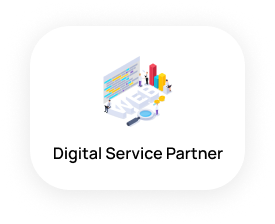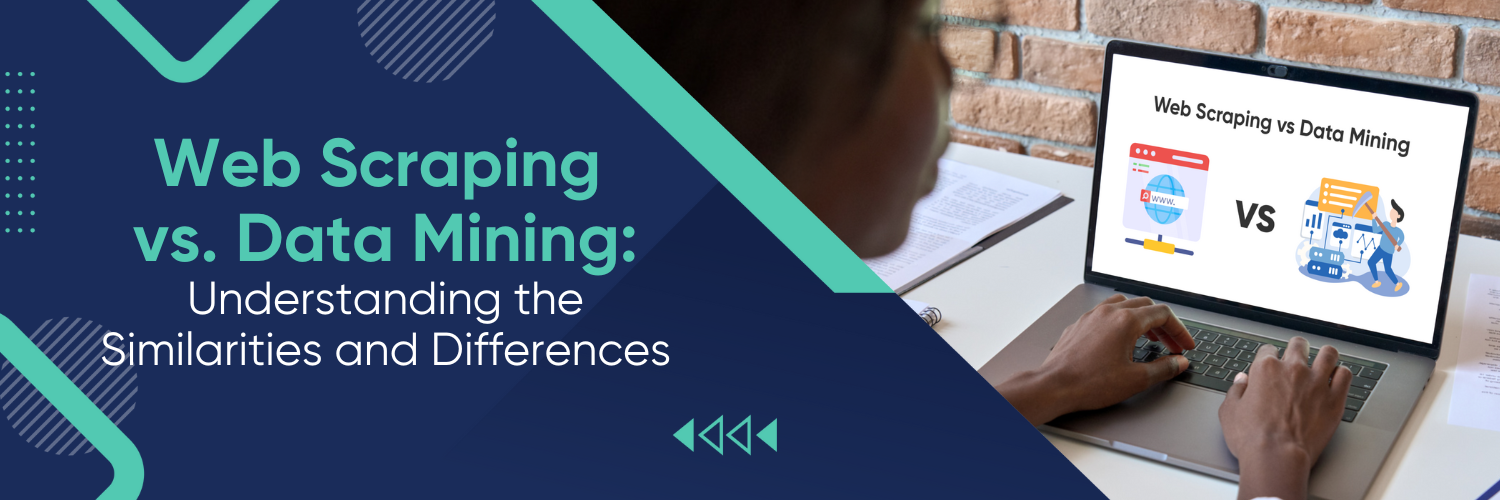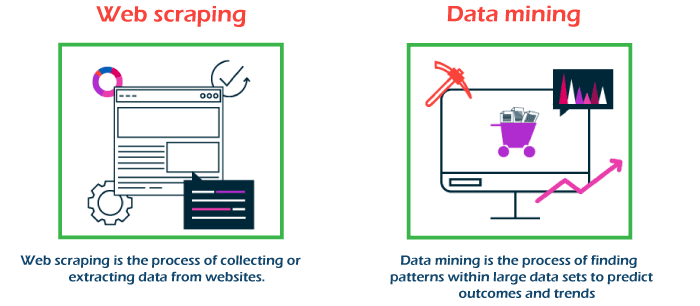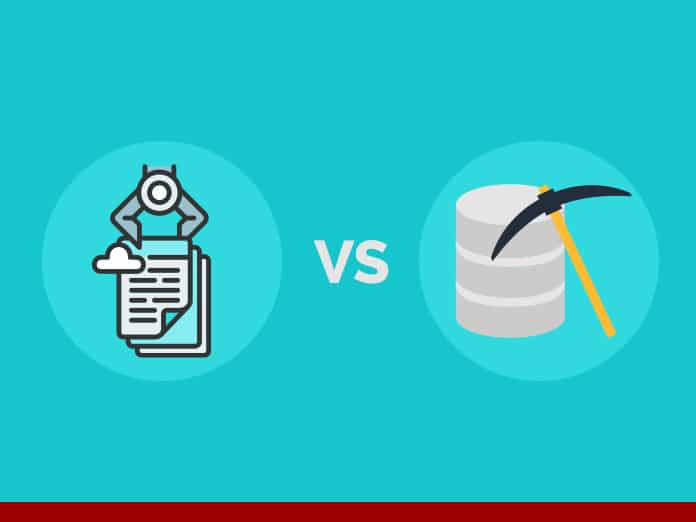What is Web Scraping?
In the world of data, there are numerous methods to gather and analyze the vast amounts of information available. Two of the most talked-about methodologies are Web Scraping and Data Mining. Understanding these concepts and their applications is crucial for any data professional or enthusiast.
Web scraping is the process of extracting data directly from the web. Typically, it involves automating the fetching process of web pages and then parsing the HTML to pull out the information of interest. Web scraping is often used when data isn’t readily available through APIs or in structured formats like CSVs.
What is Data Mining?
Data mining is the process of analyzing large datasets to identify patterns, anomalies, and relationships. Think of it as “mining” nuggets of valuable information from a vast “mine” of data. Through statistical models, machine learning, and algorithms, data mining transforms raw data into actionable insights.
Key Similarities
Both Are Data Extraction Techniques
Whether it’s pulling information from websites or extracting patterns from large databases, both web scraping and data mining serve to extract valuable data from their sources.
Automation and Scalability
Thanks to the latest tools and technologies, both web scraping and data mining can be automated, allowing vast amounts of data to be processed in relatively short periods.
Application in Business Intelligence and Research
Companies leverage both methodologies to gain market insights, monitor competitors, and drive decision-making based on data-driven research.
Web Scraping vs. Data Mining
Aspect | Web Scraping | Data Mining |
| Purpose | Extract specific data from web pages | Analyze and discover patterns in large datasets |
| Source of Data | Online websites and web pages | Databases, logs, data warehouses, etc. |
| Scope | Limited to specific websites or pages | A broad range of data sources and types |
| Automation | Primarily manual process with some automation | Highly automated process |
| Data Extraction | Focuses on retrieving structured or unstructured data from HTML pages | Involves extraction, transformation, and loading (ETL) processes |
| Frequency | Often used for one-time data collection tasks | Continuous analysis and monitoring |
| Legal Concerns | May involve terms of use and copyright issues | Privacy, compliance, and legal implications |
| Tools and Libraries | BeautifulSoup, Scrapy, Selenium, etc. | Weka, RapidMiner, KNIME, etc. |
| Data Cleaning | Limited data cleaning and preprocessing | Extensive data cleaning and preprocessing |
| Analysis Techniques | Minimal analysis, mainly data extraction and, at most, basic parsing | Various techniques like clustering, classification, regression, etc. |
| Scale | Suitable for small-scale data collection | Designed for large-scale data analysis |
| Examples | Extracting product prices from e-commerce sites | Customer segmentation from sales data |
Critical Differences
Primary Goals: Retrieval vs. Analysis
- Web Scraping: The core aim is to fetch data from the web. This might be product prices, reviews, or any web content.
- Data Mining: Its primary goal is not just data retrieval but deriving meaningful patterns and insights from that data.
Tools and Technologies Used
- Web Scraping: Tools like Scrapy make crawling websites straightforward, Beautiful Soup aids in parsing HTML, and Selenium can automate browser tasks for dynamic content retrieval.
- Data Mining: Software like Weka offers a collection of machine learning algorithms, RapidMiner focuses on deep data preparation, and KNIME is known for its user-friendly, graphical interface for data analysis.
Ethical Considerations and Limitations
- Web Scraping: Always respect the robots.txt file of websites, which provides guidelines on what can or cannot be scraped. Additionally, scraping without permission might lead to legal consequences.
- Data Mining: One must always ensure data privacy. Data mining can sometimes lead to overfitting, where models perform exceptionally well on training data but poorly on new, unseen data.
Practical Applications and Case Studies
How Web Scraping Powers E-commerce Price Monitoring
E-commerce platforms routinely employ web scraping to monitor competitor prices, enabling them to adjust their pricing strategies in real time and stay competitive.
Data Mining in Customer Segmentation
Businesses use data mining techniques to segment their customers based on buying habits, preferences, and demographics, allowing for targeted marketing campaigns.
Combining Web Scraping and Data Mining for Market Analysis
Web scraped data, once cleaned and structured, can be mined to discern market trends, customer sentiments, and potential business opportunities.
Deciding Between Web Scraping and Data Mining
Assessing Your Objectives
While both methodologies provide value, it’s essential to determine the primary objective: data retrieval (web scraping) or data analysis (data mining).
Skill Set and Resources Needed
Web scraping requires proficiency in coding and understanding web structures, while data mining requires statistical and analytical skills.
Long-term Sustainability and Adaptability
Consider the ongoing needs of your project. Web scraping might need regular script updates due to website changes, while data mining models might need tuning based on fresh data.
Conclusion
In the ever-evolving landscape of data-driven decision-making, web scraping and data mining play distinct yet complementary roles. Understanding their differences and commonalities is crucial for harnessing the power of information in the digital age. As you embark on your data journey, remember to uphold ethical standards and legal obligations to ensure responsible data usage. Whether you’re seeking to extract valuable insights from the web or delve into the depths of your existing datasets, the right approach depends on your unique goals.
Ubique Digital Solutions is an IT consultant and software implementation expert. With their expertise and cutting-edge solutions, you can seamlessly integrate software and other application, propelling your business toward unparalleled success. Reach out to us today.
FAQs
Q: Can web scraping and data mining be used together?
Absolutely! Data scraped from the web can be cleaned and then mined to derive valuable insights.
Q: Are there free tools available for both web scraping and data mining?
Yes. For instance, Beautiful Soup for web scraping and Weka for data mining are both free.
Q: How can I ensure I’m ethically scraping data from websites?
Always respect a website’s robots.txt file and seek permission when in doubt.
Q: How does data mining handle large data sets?
Through efficient algorithms and software optimizations, data mining can process large data sets to derive patterns and relationships.
Q: Which industries benefit the most from web scraping and data mining?
E-commerce, finance, healthcare, and marketing, among others, leverage these techniques for various purposes, from price monitoring to predictive analytics.




















